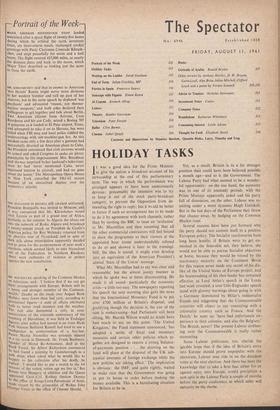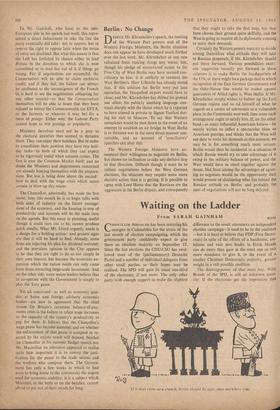HOLIDAY TASKS
T was a good idea for the Prime Minister Ito give the nation a broadcast account of his stewardship at the end of this parliamentary term. The way in which the performance was arranged appears to have been unnecessarily devious: presumably the intention was to try to keep it out of the stock party-broadcast category, to prevent the Opposition from de- manding the right to reply; but it would be better in future if such an arrangement has to be made to do it by agreement with both channels, rather than by inviting the BBC to issue an 'invitation' to Mr. Macmillan and' then assuming that all the other commercial contractors will feel bOund to show the programme to their viewers at the appointed hour (some understandably refused to do so and showed it later in the evening). Still, the idea is sound; it might even develop into an equivalent of the American President's annual 'State of the Union' message.
What Mr. Macmillan had to say was clear and reasonable; but the almost jaunty manner in which he spoke was at times disconcerting. He made it all sound—particularly the economic crisis—a little too easy. The newspapers reporting his speech the next morning also gave the news that the International Monetary Fund is to put over £700 million at Britain's disposal; and gratifying though the decision is, the size of the sum is embarrassing—had Parliament still, been sitting, Mr. Harold Wilson would no doubt have had much to say on this point. 'The United Kingdom,' the Fund statement announced, 'has adopted a series of fiscal and monetary measures and certain other policies which to- gether are designed to restore a strong balance- of-payments position . . . the drawing on the fund will place at the disposal of the UK sub- stantial' amounts of foreign exchange while the new policies are taking effect.' The implication is obvious: the IMF, and quite rightly, waited to make sure that the Government was going to put its house in order before making the money available. This is a humiliating situation for Britain to be in. Yet, as a result, Britain is in a far stronger position than could have been believed possible a month ago—and so is the Government. The Labour Party had what seemed to be a wonder- ful opportunity: on the one hand, the economy was in one of its unsteady periods, with the Prime Minister apparently jaded and his party full of dissension; on the other, Labour was re- uniting under a more dynamic Hugh Gaitskell. But in the last days of the Parliament they threw that chance away, by hedging on the Common Market issue.
Several reasons have been put forward why the party should not commit itself to a positive European policy. The Socialist reactionaries have long been hostile; if Britain were to get en- meshed in the federalist net, they believe, she would not be able to pursue Socialist objectives at home, because they would be vetoed by the reactionary majority on the Continent Bevin for this reason never made any secret of his dis- like of the United States of Europe project, and his brainwashing of his then leader has remained effective, as Lord Attlee's speech in the 'Lords last week revealed; a sour little-Englander speech laced with gloomy warnings about going in with a Germany dominated by Hitler's industrialist friends and suggesting that the Commonwealth countries will object to our consorting with a colonialist country such as France. And the Dutch,' he went on, 'have had unfortunate ex- perience in their colonies; and also the Belgians.' The British, never? The present Labour slobber- ing over the Commonwealth is really rather nauseating.
Some Labour politicians, too, cherish the ignoble hope that if the idea of Britain's entry into Europe should prove unpopular with the electorate, Labour may ride in on the dissident votes at the next election. And there has been the knowledge that to take a firm line, either for or against entry into Europe, would precipitate a new split in the Labour. Patty a couple of months before the party conference, at which unity will certainly be the theme. To Mr. Gaitskell, who leant to the anti- European side in his speech last week, this repre- sented a direct inducement to take the line the party eventually did take: not to oppose, but to reserve the right to oppose later when the terms of entry are disclosed. But what this means is that the Left has forfeited its chance either to lead Britain in the direction to which she is now committed or to lead her out of it if things go wrong. For if negotiations are successful, the Conservatives will be able to claim exclusive credit; and if they fail, the failure can always be attributed to the intransigence of the French (it, is hard to see the negotiations collapsing for any other reason)—so that the Conservatives themselves will be able to boast that they have refused to betray the Commonwealth (or EFTA, or the farmers, or whoever it may be) for a mess of potage. Either way, the Labour Party cannot hope to win prestige or popularity.
Ministers therefore need not be a prey to the electoral anxieties that seemed to threaten them. They can enjoy their holidays. But in order to consolidate their position they have two holi- day tasks—in both of which they can expect to be rigorously tested when autumn conies. The first is over the Common Market itself; and no doubt the Ministers and departments concerned are already busying themselves with the prepara- tions. But less is being done about the second: how to deal with the •wage crisis which seems certain to blow up this winter.
The Chancellor, admittedly, has made the first move; later this month he is to begin talks with both sides of industry on the future manage- ment of the economy, and the keeping in step of productivity and incomes will be the main item on the agenda. But this essay in planning, useful though it could turn out to be, cannot produce quick results. What Mr. Lloyd urgently needs is a design for a holding action : and present signs are that it will be hard to find. Already, some firms are rejecting his plea for dividend restraint; and the prevalent opinion in the City appears to be that they are right to do so not simply in their own interest, but because the economic ex- pansion which the nation needs can only come from firms attracting large-scale investment. And on the other side, some union leaders believe that to co-operate with the Government is simply to play the Tory game.
Yet all concerned—as well as economic pun- dits at home and foreign advisory economic bodies—are now in agreement that the chief reason for Britain's recurrent balance-of-pay- ments crisis is the failure to relate wage increases to the capacity of the country's productivity to pay for them. It follows that the Chancellor's wage pause has become essential; and on whether the enforcement of that pause is accepted or re- jected by the unions much will depend. Neither the Chancellor in his summer Budget speech nor Mr. Macmillan on television appeared to realise quite how important it is to convey the justi- fication for the pause to the trade unions and the workers who compose them. The Govern- ment has only a few weeks 'in which to find ways to bring home to the community the urgent need for economic stability; it is a subject which Ministers, at the butts or on the beaches, cannot afford to put out of their minds for long.































 Previous page
Previous page